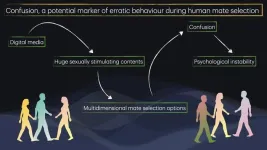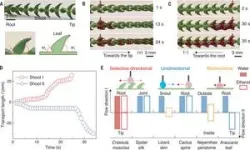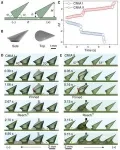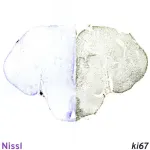(Press-News.org) A recent sociological study finds that most young adults surveyed reported feeling confused about their options when it comes to dating decisions. Preliminary analysis suggests that more than half of young people experience confusion about choosing life-partners, with women appearing to be more likely to report partner selection confusion than men.
Due to the pervasiveness of social media and digital dating in everyday lives, humans are now exposed to many more potential mates than ever before, but the availability of popular dating apps and ease of photo enhancement can distort the reality of the available pool of dating candidates.
“Human mate selection is a complicated psychological process, which is effectively influenced by multiple societal factors including appearance, personality and financial situation,” says Chayan Munshi, Founder and Executive Director of the Ethophilia Research Foundation in Santiniketan, India. “More recently, this has become significantly influenced by social media where constant exposure to sexually stimulating or attractive content creates certain perceptions of reality in the young mindset, which ultimately creates confusion in terms of selecting potential mating partners.”
The Ethophilia Research Foundation is a research group focused on behavioural biology research and public health, who have recently started to investigate how the digitalisation of society is regulating human behaviour. “This project started with extensive observation of human behavioural patterns regarding partner choice,” says Mr Munshi. “This observational study was followed by direct interactions with a young population using an open questionnaire.”
The preliminary results of this ongoing project come from a survey of young adults in India, with most respondents being between 18 and 30 years old. Further analysis of the results is underway, with an expanded survey in preparation to include more specific lines of inquiry.
The questionnaire included questions related to romantic partner selection, such as “Do you feel confused when selecting a life-partner?”, “What are your criteria for selecting a life-partner?”, “Do you still look for other partners if you are already in a stable relationship?” and “Do you like to switch to a ‘better option’ when selecting a life-partner?”.
These initial results show that the perception of potential mate availability may be skewing how people judge their life-partner options, even while in existing relationships. “For instance, impulsiveness is significantly exhibited, and there is a decrease in in-person social interactions,” says Mr Munshi. “This is exposing confusion while people search for a mating partner and can manifest complexities in maintaining a relationship.”
Mr Munshi expects that this ongoing research will help to build a better understanding of how mate selection is evolving in humans. “Our hypothesis strongly indicates that the ‘pleasure index’ or ‘adrenaline rush’ of relationships is taking more prime importance in the younger generation over long-term stability,” he says. “It is alarming that impulsiveness or confusion can lead to instability in the human relation-maintaining behaviour, which is actually affecting the normal social behaviour in humans.”
“The pattern now is notable enough to indicate that this might modify the social norms of partner choice behaviour in young humans, which might have significant effect on the brain-behaviour circuit,” says Mr Munshi. “In the long run, this may eventually alterthe fundamental protocol of evolutionary mating strategies.”
This research is being presented at the Society for Experimental Biology Annual Conference in Prague on the 2-5th July 2024.
END
Social media is a likely cause of ‘confusion’ in modern mate selection
2024-07-03
ELSE PRESS RELEASES FROM THIS DATE:
Exploring bird breeding behaviour and microbiomes in the radioactive Chornobyl Exclusion Zone
2024-07-03
New research finds surprising differences in the diets and gut microbiomes of songbirds living in the radiation contaminated areas of the Chornobyl Exclusion Zone, Ukraine. This study is also the first to examine the breeding behaviour and early life of birds growing up in radiologically contaminated habitats.
The Chornobyl Exclusion Zone (Ukrainian), also known as the Chernobyl Exclusion Zone (Russian), is an area of approximately 2,600 km2 of radiologically contaminated land that surrounds the Chornobyl Nuclear Power Plant. The levels of contamination are uneven throughout the zone.
“The ...
Discovering new anti-aging secrets from the world’s longest-living vertebrate
2024-07-03
New experimental research shows that muscle metabolic activity may be an important factor in the incredible longevity of the world’s oldest living vertebrate species – the Greenland shark. These findings may have applications for conservation of this vulnerable species against climate change or even for human cardiovascular health.
Greenland sharks (Somniosus microcephalus) are the longest living vertebrate with an expected lifespan of at least 270 years and possible lifespan beyond 500 years. “We want to understand what adaptations ...
Pregnant fish can also get “baby brain”, but not the way that mammals do
2024-07-03
New research reveals that pregnancy-related brain impairment is present in live-bearing fish, but instead of affecting learning and memory as expected from similar research on mammals, it appears to have a stronger impact on decision-making and sensory reception.
There have been many studies into the detrimental impact of pregnancy on mammalian brains, sometimes called “baby brain” or “momnesia” in humans, revealing how the disruption of neurological processes like neurogenesis, or the creation ...
Pasteurization inactivates highly infectious avian flu in milk
2024-07-03
Highlights:
• In late March 2024, H5N1 bird flu was detected in dairy cattle and then in raw milk.
• Researchers tested hundreds of milk products from dozens of states for the virus.
• No infectious virus was found in pasteurized milk products.
• Non-infectious traces of viral genetic material were found in 20% of samples.
Washington, D.C.—In March 2024, dairy cows in Texas were found to be infected with highly pathogenic avian flu, ...
KIER develops 'viologen redox flow battery' to replace vanadium’
2024-07-03
A technology has been developed to replace the active material in large-capacity ESS 'redox flow batteries' with a more affordable substance.
*Redox Flow Battery: A term synthesized from Reduction, Oxidation, and Flow. It is a battery that stores electrical energy as chemical energy through oxidation and reduction reactions of active materials in the electrolyte at the electrode surface and converts it back to electrical energy when needed. It is capable of large-scale storage, can be used long-term through periodic replacement of the electrolyte, and its major advantage is the absence of fire risk.
Dr. Seunghae Hwang’s ...
Chemists synthesize an improved building block for medicines
2024-07-03
Chemists have overcome a major hurdle in synthesizing a more stable form of heterocycle—a family of organic compounds that are a common component of most modern pharmaceuticals.
The research, which could expand the toolkit available to drug developers in improving the safety profiles of medications and reducing side effects, was published in Science by organic chemists at the University of British Columbia (UBC), the Massachusetts Institute of Technology (MIT), and the University of Michigan.
“Azetidines ...
A genetic algorithm for phononic crystals
2024-07-03
Tokyo, Japan – The advent of quantum computers promises to revolutionize computing by solving complex problems exponentially more rapidly than classical computers. However, today's quantum computers face challenges such as maintaining stability and transporting quantum information. Phonons, which are quantized vibrations in periodic lattices, offer new ways to improve these systems by enhancing qubit interactions and providing more reliable information conversion. Phonons also facilitate better communication ...
Machine learning could aid efforts to answer long-standing astrophysical questions
2024-07-03
In an ongoing game of cosmic hide and seek, scientists have a new tool that may give them an edge. Physicists at the U.S. Department of Energy’s (DOE) Princeton Plasma Physics Laboratory (PPPL) have developed a computer program incorporating machine learning that could help identify blobs of plasma in outer space known as plasmoids. In a novel twist, the program has been trained using simulated data.
The program will sift through reams of data gathered by spacecraft in the magnetosphere, the region of outer space strongly affected by Earth’s ...
Research spotlight: Uncovering how a cellular miscommunication leads to cognitive impairment in female patients with Alzheimer’s disease
2024-07-03
Lead author Neta Rosenzweig, PhD, of the Ann Romney Center for Neurological Diseases, and senior author Oleg Butovsky, PhD, of the Ann Romney Center and Gene Lay Institute of Immunology and Inflammation, share key messages from their paper “Sex-Dependent APOE4 Neutrophil-Microglia Interactions Drive Cognitive Impairment in Alzheimer’s Disease” published in Nature Medicine.
How would you summarize your study for a lay audience?
In this manuscript, we identify that a major genetic risk ...
AI model to improve patient response to cancer therapy
2024-07-03
A new artificial intelligence (AI) tool that can help to select the most suitable treatment for cancer patients has been developed by researchers at The Australian National University (ANU).
DeepPT, developed in collaboration with scientists at the National Cancer Institute in America and pharmaceutical company Pangea Biomed, works by predicting a patient’s messenger RNA (mRNA) profile. This mRNA - essential for protein production - is also the key molecular information for personalised cancer medicine.
According to lead author Dr Danh-Tai Hoang from ANU, when combined with a second tool called ENLIGHT, DeepPT ...








